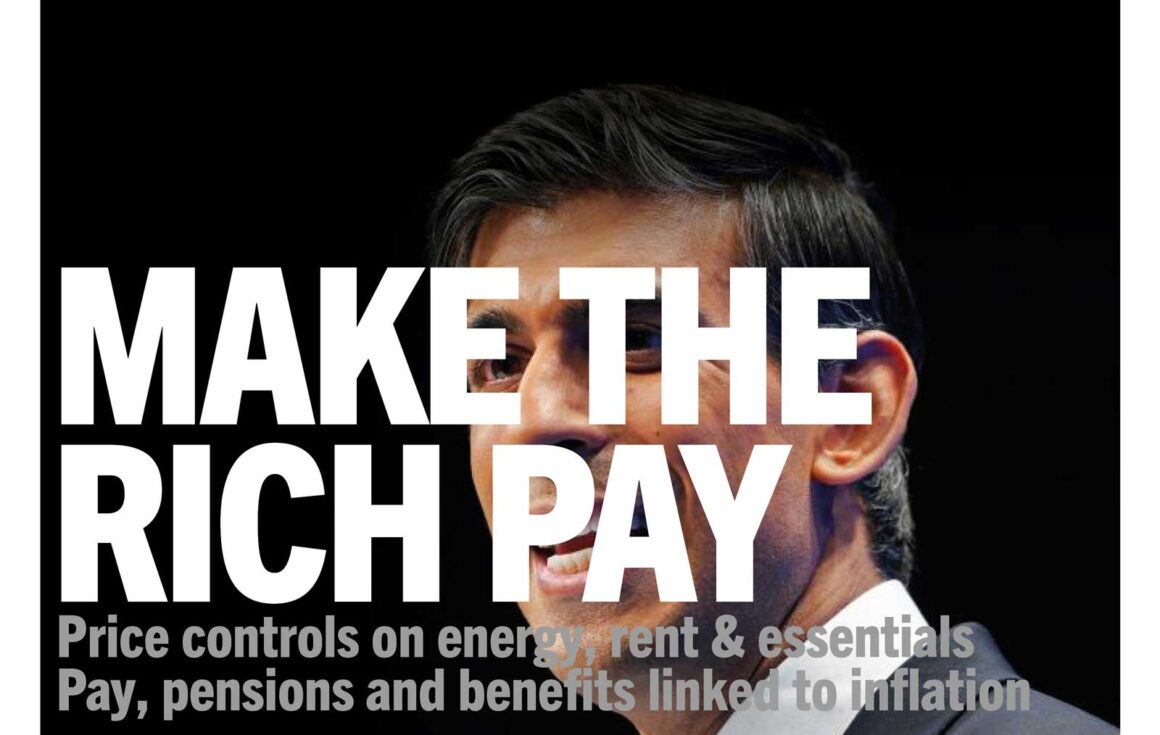

By R. Banks
IN A desperate effort to distract the public’s attention from the ongoing Partygate scandal, Chancellor Rishi Sunak has unveiled a package of measures to help those ‘hit hard’ by the cost of living crisis, partially funded by a windfall tax on energy profits.
While scandal was the impetus for the announcement, desperate action is indeed needed to mitigate the impact of inflation, which is rising even faster than forecast. The energy price cap, already raised by £693 in April, is set to increase by a further £830 in October.
For the millions of workers and the unemployed struggling to make ends meet, the Chancellor’s announcement will no doubt come as some relief.
The Tories have stolen a march on Labour, effectively plagiarising their only concrete policy proposal in response to the crisis. The announcement sparked criticism from reactionary quarters, including the Confederation of Business Industry (CBI), with one MP, Richard Drax, accusing the Chancellor of ‘throwing red meat to socialists’. However, many in the press have uncritically swallowed the government line, parroting Sunak’s statement that his mini-budget will ‘make sure the most vulnerable and least well off get the support they need at this time of difficulty’.
What’s on offer?
The Chancellor has announced an additional £15bn support package which includes: a one-off £650 payment to households on Universal credit, tax credits, pension credit and legacy benefits; a separate one-off £300 payment to pensioner households; and £150 to individuals receiving disability benefits. In addition, the £200 energy bills discount due in October is being increased to £400 and the requirement to pay it back scrapped.
These relief funds will be raised by a 25% levy on oil and gas companies’ ‘extraordinary profits’. However, an ‘80% investment allowance’ will double the amount of tax relief companies get on any profits they reinvest, saving them 91p for every £1 they invest. Another tax cut for the rich. Also the new levy does not apply to the electricity generation sector, where monstrous profits are also being extracted.
The Government expects to raise around £5bn in the first 12 months, but made clear that the tax is temporary and will be phased out if oil and gas prices return to ‘historically more normal levels’.
The chancellor also set out his so-called ‘strategy’ to control inflation through ‘independent monetary policy, fiscal responsibility and supply side activism’. For those not versed in Tory economic jargon, this is code for allowing the Bank of England to continue its free reign over interest rates, and the government to slash public spending and give tax breaks to the rich.
These measures go further than Labour had demanded. The party’s proposal was for only £200 relief for the average household and up to £600 for the hardest hit. The windfall tax to be implemented by the Tories is also higher than the 10% levy proposed by Keir Starmer’s Labour. The problem with Labour’s strategy of posing just ever so slightly to the left of the Tories is, now that its inadequate measures have been surpassed, the ‘opposition’ is sidelined.
But this should not disguise the fact that Sunak is offering a raw deal to working families. The ‘energy bill discount’ still leaves most households down by over £1,000 a year. October’s planned £830 rise in the energy price cap is estimated to cost UK households a collective £19bn.
Make the bosses pay
Ofgem has decided to protect the super-profits of energy giants at the expense of the working class. BP and Shell alone are expected to make a combined £40bn in profits this year across their global operations.
They should be nationalised without compensation and placed under workers’ control. That way we can cap prices at levels set by consumers, certainly no higher than they were last summer. Investment must be channelled into renewable energy production, not more oil and gas.
The unions need to launch a wave of strikes over pay around the unifying slogan of 15% or £15 an hour, whichever is higher. Instead of fighting alone, the strikes should be co-ordinated and wherever possible linked together.
We also need a mass movement, like the poll tax rebellion. State pension and benefit increases were capped at 3.1% this year, way below inflation, which even the Bank of England acknowledges is running at 11% for the poorest. They should be set at the level of the minimum wage, below which nobody should be expected to suffer.
Finally, we need local action committees, cost of living campaigns: not the branded ones that only exist for set-piece demos and online rallies, but real ones that draw in delegates from all the workplaces, unions, pensioners and youth campaigns.
If we can do this, we can turn the cost of living crisis into a crisis not just of capitalism but a crisis for capitalism.